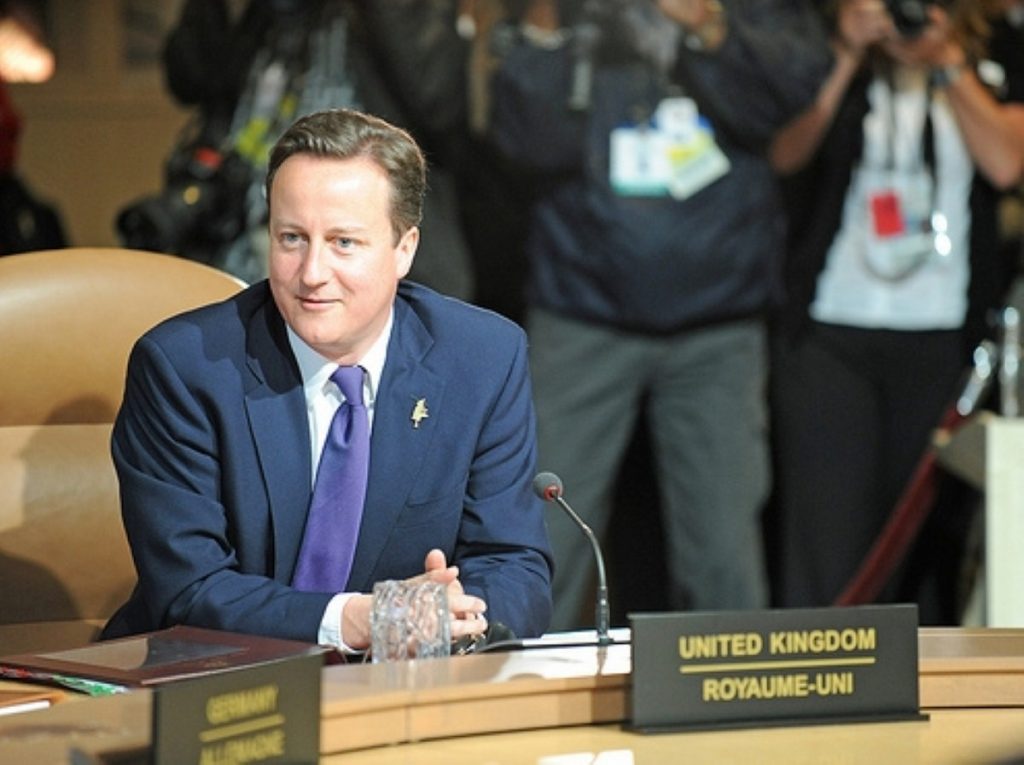48 hours of diplomacy: Cameron’s toughest statesmanship test yet
Even by the prime minister's hectic standards, this is a busy week. After the Queen's Speech rigmarole David Cameron heads off to the continent for 48 hours of intensive diplomacy – and arguably the greatest test of his statesmanship yet.
Bashing Putin
First comes the meeting of the G7 in Brussels – the first time the world's leaders have met at this level since Lyon in 1996. Russia's illegal invasion of the Crimea is the trigger for this, of course. Even without Vladimir Putin's absence the summit would feel rushed, with the diplomatic 'sherpas' not having put in the usual legwork. There will not be the usual delegations of African leaders or leaders of international institutions lobbying the group. Even in the privacy of the conference room things will feel strange. Cameron and Angela Merkel will split the chairing of sessions, meaning no single country is in charge.
All this is to send a clear message to Putin that he is being shut out by the international community. The communiqué is already, broadly speaking, a done deal. And this morning a statement has been released condemning the "continuing violation of the sovereignty and territorial integrity of Ukraine". You get the message.
But will Putin? Perhaps not. The effect of being frozen out may be undermined by a series of one-on-one meetings he's having with Merkel, Cameron and Francois Hollande on the fringes of events marking the D-Day anniversary, which take place in Normandy on Friday.
Bashing Juncker
The anti-Russia mission is easy in the sense that there is little division within the G7 on the issue. A much trickier challenge for Cameron this week will be his fight against the potential appointment of federalist Jean-Claude Juncker as the next president of the European Commission. The PM's pitch has been foiled after Merkel, who had been wavering, changed her mind about Juncker. Now Britain risks seeming isolated and endangering its broader renegotiation strategy.
Can Cameron do anything to turn this around this week? Right now Downing Street is just resorting to playing for time. There's a month to go until the July summit of EU leaders when Jose Manuel Barroso's successor will probably be picked. "What the prime minister's calls to European leaders have shown is there is a view amongst those sat around the table that they want to find a consensus," Cameron's spokesperson said. That may be true. But it is also true that Merkel has made clear Juncker could end up being forced on Britain via the EU's qualified majority rules. So much for 'consensus'.
Keeping Obama happy
Amid all the tensions of European politics comes a vital meeting, on Thursday afternoon, with the president of the United States. Schedules permitting, No 10 hopes Cameron will get a full hour of chit-chat with Barack Obama. These opportunities don't come around as often as you'd think: the last time the pair spent this long together was in May 2013. They will spend most of their time talking about foreign affairs. Nigeria will be on the agenda. There will be talk about this year's Nato summit – just after it announced it would beef up its European defences. Afghanistan will be discussed, as always. And they will try to beef up the advantages of the EU-US trade deal, which looks in trouble amid faltering talks. They will be looking to "send a message to the negotiators that they have the political will to get through this", according to Cameron's spokesperson.
Don't forget Syria
All that attention on the Ukrainian crisis has bumped Syria off the top of the agenda – even though Bashar al-Assad's re-election propaganda exercise makes this a vital moment for the conflict. Without Russia's equivocation it will be easier for the G7 to make its feelings known. All the same, there is a sense those feelings have been repeated so many times their impact is becoming limited.
So the more important diplomatic efforts on Syria will be around focusing on humanitarian access. There's an urgent need for more cross-border convoys, and Britain will be nagging Italy and France to do more to help. Then there's the security risk of Syria becoming another Iraq – a magnet for foreign fighters flocking into the country. The G7, in practical terms, is more about dealing with Syria as a damage limitation exercise than anything else.
And finally…
Finally, right at the bottom of the list, comes the issue which will arguably affect more people than any other mentioned so far. Britain made development the cornerstone of its chairmanship of the Lough Erne summit earlier this year. So Cameron will spend Thursday's working lunch on the issue trying to follow up, bugging world leaders to fulfil their commitments on Britain's 'three Ts' agenda covering tax, trade and transparency.





-01.png)